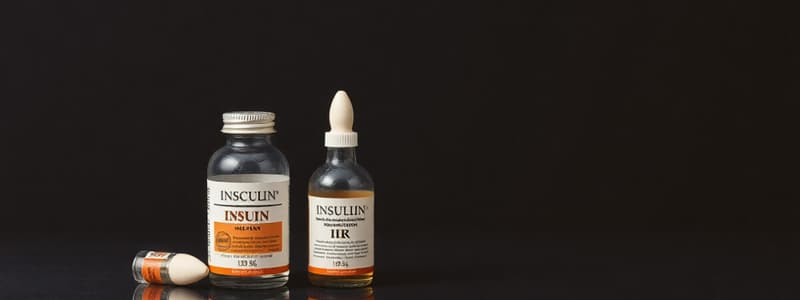Podcast
Questions and Answers
Which type of insulin is the only one that can be administered intravenously?
Which type of insulin is the only one that can be administered intravenously?
- Insulin Glargine (Lantus)
- NPH (Novolin N)
- Human Regular Insulin (Novolin R) (correct)
- Insulin Lispro (Humalog)
What is the duration of action for Insulin Glargine (Lantus)?
What is the duration of action for Insulin Glargine (Lantus)?
- 18-24 hours
- 24 hours (correct)
- 8 hours or longer
- 5-7 hours
Which of the following insulin types has no peak?
Which of the following insulin types has no peak?
- Insulin aspart (Novolog)
- Insulin Glargine (Lantus) (correct)
- Ultralente
- NPH
When should the combination insulin NPH 70%/Human regular 30% typically be administered?
When should the combination insulin NPH 70%/Human regular 30% typically be administered?
Which oral hypoglycemic agent is known to have common side effects including hypoglycemia and heartburn?
Which oral hypoglycemic agent is known to have common side effects including hypoglycemia and heartburn?
What is the onset time for U500 insulin?
What is the onset time for U500 insulin?
Which of the following insulin types is characterized as cloudy in appearance?
Which of the following insulin types is characterized as cloudy in appearance?
What is a common side effect of oral hypoglycemic agents?
What is a common side effect of oral hypoglycemic agents?
What should be done if a patient experiences severe gastrointestinal upset while taking medication?
What should be done if a patient experiences severe gastrointestinal upset while taking medication?
Which of the following medications is NOT recommended for the elderly?
Which of the following medications is NOT recommended for the elderly?
What increases the risk of hypoglycemia when taking diabetes medications?
What increases the risk of hypoglycemia when taking diabetes medications?
What must be monitored in patients taking corticosteroids over a long period?
What must be monitored in patients taking corticosteroids over a long period?
What should patients be educated about concerning corticosteroid therapy?
What should patients be educated about concerning corticosteroid therapy?
What is a common adverse reaction associated with the long-term use of corticosteroids?
What is a common adverse reaction associated with the long-term use of corticosteroids?
Which statement is true regarding the administration of Prednisone?
Which statement is true regarding the administration of Prednisone?
Which of the following is NOT an indication for corticosteroid therapy?
Which of the following is NOT an indication for corticosteroid therapy?
Flashcards are hidden until you start studying
Study Notes
Insulin Products Used at HFH
- Rapid acting insulin:
- Insulin Lispro (Humalog)
- Administer when the food tray arrives, not before.
- Short acting insulin:
- Human regular insulin (Novolin R)
- Only insulin that can be given intravenously (IV).
- Hypoglycemia is likely before lunch.
- Can be mixed with NPH or Lente insulin; draw regular insulin (clear) first.
- Intermediate acting insulin:
- NPH (Novolin N)
- Hypoglycemia most likely occurs between 3pm and dinner.
- Long acting insulin:
- Insulin Glargine (Lantus)
- Long-acting insulin with no peak.
- Clear and cannot be mixed with other insulins.
- Ultralente (Humulin U)
- Detemir (Levemir)
- Combination insulin:
- NPH 70%/Human regular 30% mixture (Novolin 70/30)
- Usually given 15-30 minutes before breakfast and supper.
- Ultralente (Humulin U)
- Concentrated Insulin:
- U500 insulin
Insulin Pharmacodynamics
- Insulin aspart (Novolog) has an onset of 5-10 minutes, peaks in 1-3 hours, and lasts for 3-5 hours. It’s clear and given subcutaneously (SQ).
- Human Regular insulin has an onset of 1/2 to 1 hour, peaks in 2-4 hours, and lasts for 5-7 hours. It’s clear and given IV or SQ.
- NPH has an onset of 1-2 hours, peaks in 6-14 hours, and lasts for 24+ hours. It’s cloudy and given SQ.
- Ultralente has an onset of 6 hours, peaks in 18-24 hours, and lasts for 36+ hours. It’s cloudy and given SQ.
- Insulin glargine (Lantus, Levemir) has an onset of 1 hour, has no peak, and lasts for 24 hours. It’s clear and given SQ.
- U500 has an onset of 30 minutes, peaks in 2-4 hours, and lasts for 8 or longer hours. It’s clear and given SQ.
Oral Hypoglycemic Agents
- Chlorpropamide (Diabinese), Glipizide (Glucotrol), Glyburide (Diabeta, Glynase, PresTab, Micronase), Tolbutamide (Orinase), Metformin (Glucophage), Tolazamide (Tolinase), Sitagliptin (Januvia), Canagliflozin (Invokana), Empagliflozin (Jardiance)
General Information About Oral Hypoglycemic Agents
- Stimulates insulin release from pancreatic beta cells, reduces glucose output by the liver, and enhances excretion of glucose by the kidneys.
- Onset is 1 hour, peak is 3-4 hours, and duration is 60 hours.
- Common side effects: anorexia, nausea, vomiting, epigastric discomfort, heartburn, and hypoglycemia.
- Administer before breakfast. If severe GI upset, divide the dose - one before breakfast and one before the evening meal.
- IV glucose for severe hypoglycemia.
- Not to be used for type I diabetes, in pregnancy, or lactation.
- Avoid alcohol and take at the same time each day.
- Diabinese is NOT recommended for the elderly.
- Glipizide (Glucotrol) has very few drug-to-drug interactions and IS recommended for the elderly.
- Increased risk of hypoglycemia if taken with juniper berries, ginseng, garlic, fenugreek, coriander, dandelion root, or celery.
Corticosteroids
- Prednisone, prednisolone, hydrocortisone (Cortisol)
Indications for Corticosteroids
- Treatment of various diseases, including:
- Adrenocortical insufficiency
- Hypercalcemia
- Rheumatic and collagen disorders
- Dermatologic, respiratory, gastrointestinal, and neoplastic disease
- Organ transplantation
- Hematologic, allergic, inflammatory, and autoimmune diseases.
Adverse Reactions of Corticosteroids
- Chronic, long-term use may result in Cushingoid appearance, osteoporosis, muscle weakness, and suppression of the adrenal-hypothalamic-pituitary axis.
- Insomnia
- Nervousness
- Increased appetite
- Indigestion
- Headache
- Diabetes mellitus
- Cataracts
- Glaucoma
- Hirsutism
Nursing Considerations for Corticosteroids
- Monitor patient for weight gain and fluid retention.
- Withdraw therapy with gradual tapering of the dose.
- Administer oral dose with food or after meals to reduce GI irritation.
- Prednisone may decrease response and increase potential infections.
- Prednisone may increase blood glucose levels.
Patient Education for Corticosteroids
- Take exactly as directed. Do not take more than prescribed.
- Do not discontinue abruptly.
- Take with meals or after meals.
- If diabetic, monitor serum glucose closely and notify physician of changes.
- Notify physician if experiencing higher than normal levels of stress, as medication may need to be adjusted.
- Periodic ophthalmic examinations will be necessary with long-term use.
- Monitor for signs and symptoms of infections and avoid crowds or infectious people with contagious diseases.
- Report weakness, change in menstrual pattern, vision changes, signs of hyperglycemia, signs of infection, or worsening of the condition.
Studying That Suits You
Use AI to generate personalized quizzes and flashcards to suit your learning preferences.




